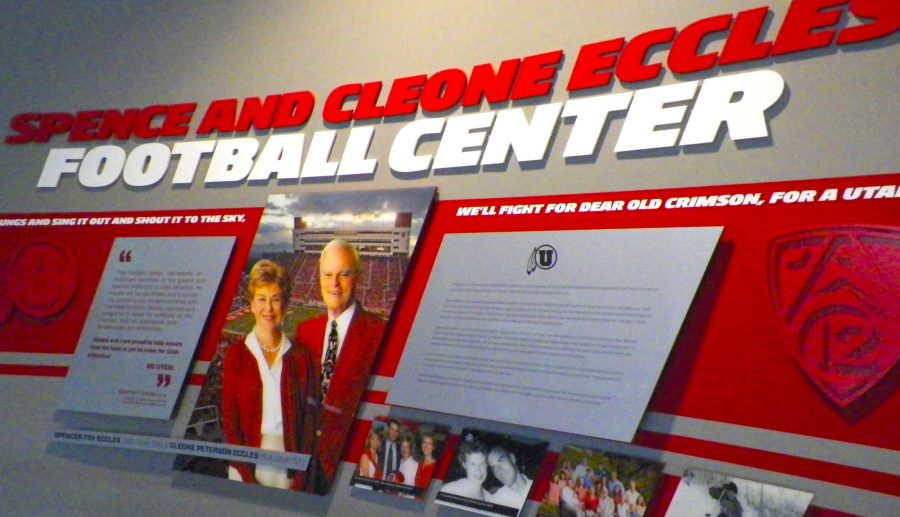As humans strive to reach the limits of their abilities, they’ve meticulously measured, charted and innovated upon every facet of their own input. No such line of work has been scrutinized and molded quite like athletics. From physical conditioning regimens to dietary plans and restrictions, the day-to-day life of an athlete is as scripted and as structured as they come.
At the University of Utah, student athletes are no exception to this regimentation. Athletes under the supervision of the U, while not subjected to a “you eat what I tell you” meal plan, have some restrictions and a heavy amount of recommendations given by nutritionists.
No athlete is the same and no athlete will have exactly the same diet as any other. No team exemplifies this principle as much as the Utah football team. With up to 125 players on an NCAA Division I roster, the Utes not only have to worry about feeding their vast amount of players but must also account for the team’s dietary needs as they relate to positions.
Because of decades of research into the human body, athletes have become more and more “elite,” requiring even more meticulous care when tending to such things as diet and fitness. Such is the case at the U and the Spence and Cleone Eccles Football Center cafeteria is a vital tool in tracking what collegiate athletes eat.
The art of feeding the hundreds of Utah athletes is not left to one person, but a team of advisors and dietitians who carry the sole responsibility of providing adequate meals to U athletes. Steve Smith, Utah Athletics’ chief financial officer, spoke about the road to a universal cafeteria, which isn’t as clear as one might think.
“It took a while for legislation to be passed that let us feed our athletes so liberally,” Smith said. “[Former Utah coach] Rick Majerus got an NCAA violation for giving the kids cookies.”
As student athletes have become more entrenched with the business side of a university’s proceedings, the regulations on things such as gifts — like cookies — have been much more refined to allow universities to have more control over what they feed their own athletes.
“The NCAA has recently made some really smart decisions about student athlete health and wellness,” Smith said.
Smith works constantly alongside football dietician Craig Moore as well as head chef and cafeteria manager Tom Berdinko to design meals for athletes, something that is under constant adjustment from the top.
“We used to meet every week, then biweekly, and now pretty much once a month,” Smith said. “Just to kind of see how things are going. He works within a budget to hire the staff he needs to do the job correctly.”
Moore’s job as the team’s dietician takes on much more of a personal role with the team and its members.
“I serve as the sports dietician for the football team,” Moore said, “which means I play a role in all decisions regarding how we fuel the team.”
Moore’s role encompasses many responsibilities, and it can be hard to achieve them with such a large body of people to work with. Something that Moore emphasized is trust between himself and the players he helps to feed.
“The most important aspect of my job is to build a trusting relationship with the athletes I work with over time. If they trust me and believe I have their best interest in mind, they’re going to hear what I have to say and take my recommendations to heart.”
While the cafeteria is a wonderful tool for monitoring and assisting players with their dietary needs, the staff that oversees them can only do so much when it comes to enforcing their dietary recommendations.
“While I am with the team for every meal that we provide,” Moore said, “I can’t control what they do when they’re on their own.”
Moore, along with other officials in the football team’s hierarchy, can’t exactly control what an athlete puts into their body, but there are tell-tale signs of whether or not an athlete is sticking to the plan presented to them. Adjustments can be made to correct the course, but the athletes in question are also students, something that Moore takes into account regularly.
“It’s not uncommon for stress outside of football to cause athletes to have diminished appetites which can lead to unexpected weight loss. In situations like these, we’re very fortunate to have an amazing Director of Psychology and Wellness, Dr. Jonathan Ravarino, who serves as a resource for all of our athletes.”
The art of feeding the U’s athletes is a complex one, but the university is well-equipped to do so for years to come. The Eccles Football Building cafeteria is nothing short of the best way to safely monitor and adjust the fuel that U athletes put into their bodies.


